„Menschenökonomie“ statt „Herrschaft der Technik“
Die industriepädagogischen Konzepte des „Deutschen Instituts für technische Arbeitsschulung“ (DINTA) 1925-1933
DOI:
https://doi.org/10.12685/bp.v6i9.1500Abstract
English abstract: The “German Institute for Technical Labour Training” (DINTA), which was founded on behalf of the German heavy industry in 1925 in Düsseldorf, intended to prevent the people from being “enslaved” by technology. By acquiring ideas of the “Conservative Revolution” the institute proclaimed a “human economy”, which was supposed to shape industrial work in respect of skills and needs of the people instead. It referred to the newest research results of the science of work, especially labour physiology and industrial psychology. Out of that the DINTA introduced new educational concepts for the industrial field (“Industriepädagogik”). On that basis they invented a new training for the offspring of industrial workers and implemented it in specific apprenticeship workshops (“Lehrwerkstätten”). This article focuses on these workshops and analyses its goals and functionality referring to the theoretical and methodical approach of a New History of Labour.
Downloads
Veröffentlicht
Ausgabe
Rubrik
Lizenz

Dieses Werk steht unter einer Creative Commons Namensnennung - Nicht-kommerziell - Keine Bearbeitung 3.0 International -Lizenz.


